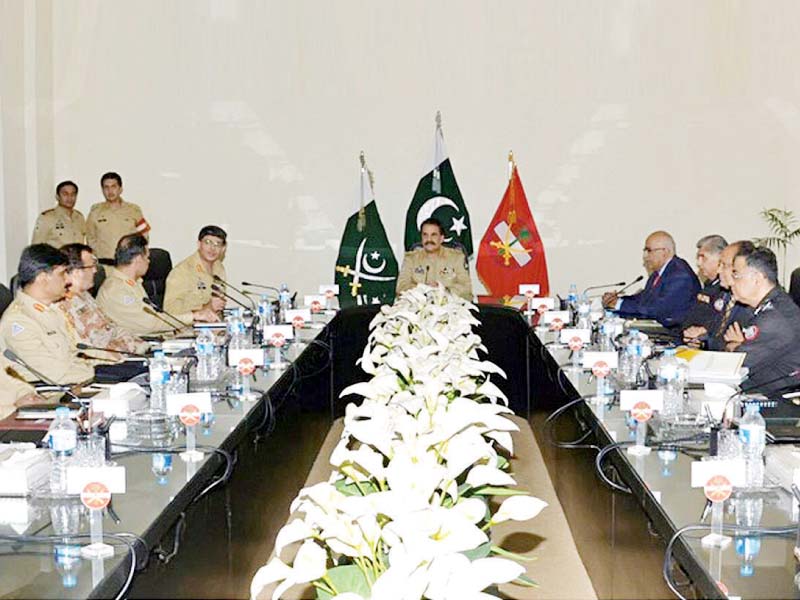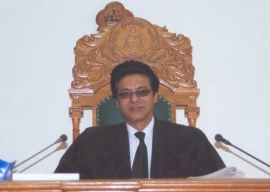
Chief of Army Staff General Raheel Sharif on Tuesday approved an increase in the number of military courts for Karachi in an effort to speed up the trial of high-profile terrorists in the metropolitan city. Initially, nine military courts were set up across the country under the National Action Plan against terrorism.
The army chief, who was in the town, appreciated the role of paramilitary Rangers, police and security agencies in the ongoing surgical operation in Karachi. “The operation will continue across the board against terrorists, criminals and mafias in Karachi,” Gen Raheel said as tweeted by Maj Gen Asim Bajwa, the chief military spokesperson, on microblogging site Twitter.
The army chief also directed the law enforcers to break the evil nexus between terrorism, criminal mafias, violence and corruption to ensure peace and a terror-free Karachi. Gen Raheel was briefed on the latest security situation in the city at the Corps Headquarters.
The Karachi corps commander, Rangers’ director general, Sindh’s chief secretary and police chief, Karachi’s commissioner and representatives of the intelligence agencies attended the meeting. Gen Raheel appreciated all ranks of the Rangers, police, intelligence agencies and particularly support of the people of Karachi. “To build capacity of the Karachi police, in addition to their training, equipment worth Rs65 million were also handed over to them,” he added.

Earlier, the army chief also visited the Army Air Defence Centre at Malir Cantt and laid a floral wreath at the martyrs’ monument where he was also briefed about training activities at the centre. Gen Raheel also pinned badges of rank on the shoulders of Lt Gen Zameerul Hassan Shah, Adjutant General Pakistan Army, to formally install him as Colonel Commandant of the Army Air Defence.
Under the NAP, three military courts were set up in Sindh – one each in Karachi, Pano Aqil and Hyderabad. “The army chief has approved an increase in the number of military courts in Karachi. Now civil and military officials have to decide how many more military courts should be established and where,” a senior police official told The Express Tribune. “The list of cases which will be sent to the military courts is ready. We have to only revise the list before sending it to the military courts,” he added.
The Karachi operation was launched on September 5, 2013 under the directives of the federal government against criminals and terrorists in view of the deteriorating law and order situation in the country’s largest metropolis. The operation yielded positive results as law enforcers netted over 70,000 criminals and killed 1,000-plus terrorists and criminals in the first 23 months of the operation.
There has been a marked improvement in the city’s security situation. “The rate of major crimes has decreased by 70 per cent and Karachiites are satisfied with the overall situation in the city,” Federal Interior Minister Chaudhry Nisar Ali Khan told a news conference in Islamabad on Monday.
Prime Minister Nawaz Sharif also said that the results of the Karachi operation were visible to all. “The citizens of Karachi want peace and the government will not allow political expediency to come in the way of restoring peace and reviving traditional tranquility of the city of the Quaid,” he told his cabinet on Monday.
“We cannot even think of taking any step back as far as the Karachi operation is concerned,” he said and held out an assurance that his administration would continue its efforts to provide peace and security to the people of the metropolis.
Published in The Express Tribune, August 26th, 2015.


1672385156-0/Andrew-Tate-(1)1672385156-0-165x106.webp)



1732011525-0/Express-Tribune-(8)1732011525-0-270x192.webp)










COMMENTS
Comments are moderated and generally will be posted if they are on-topic and not abusive.
For more information, please see our Comments FAQ